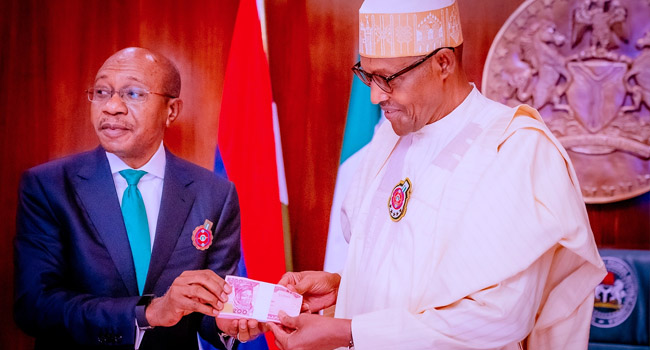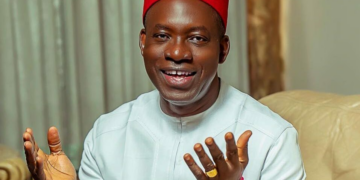President Muhammadu Buhari may not have anticipated the sufferings that came with the new naira note and cashless policy. For someone who is seen as the champion of the masses and downtrodden, the president may have been in a dilemma over the suffering of the masses.
Many Nigerians have gory tales of agony in their bid to get the new naira notes.
The question now for President Buhari is that should he side with the masses and extend the deadline indefinitely or stick to his guns and remain unpopular with the masses. Either way, something gotta give.
As of the last count, about five states have taken the federal government to court over the cashless policy.
No doubt, the thinking behind the new naira notes by the President and Central Bank Of Nigeria ( CBN) governor, Godwin Emefiele is that the policy will limit vote buying in the elections. The president had pledged to bequeath a legacy of free, fair, and credible election to Nigerians and has also often said he will not allow moneybags to intimidate the electorate. That’s the reason for the obsession to stick to the deadline for the election.
Different interpretations have been given to the sufferings of Nigerian because of the new naira and fuel scarcity on the eve of the general election. Some have asked will this policy be in place if President was seeking elections.
On Monday, the president was in Katsina for the All Progressive Congress presidential campaign rally.
In a visit to the Emir of Katsina place, the Emir thanked President Buhari for presenting the APC candidate to the Emirate Council and citizens of Katsina, assuring them that they will pray and mobilize for victory at the polls.
He appealed to the President to look into the challenges posed by currency swaps, adding that the “pain of the people, should be the pain of leadership.”
On Friday the president presided over the council of state meeting at the Presidential Villa.
The Council of State threw its weight behind the new naira note policy advising the CBN to make new Naira notes available or recirculate old Naira notes to ease the suffering of Nigerians.
Governors of Taraba, Darius Ishaku, Lagos, Babajide Sanwo-Olu, and the Attorney General of the Federation and Minister of Justice, Abubakar Malami, who briefed State House correspondents on the resolutions of the meeting said generally the policy was accepted by members but raised concerns about the implementations.
Ishaku said: “The CBN was advised to make money available in quantum. The old money can also be recirculated to ease the suffering of the poorest of the poor.”
Sanwo-Olu, on his part, said the Chairman of the Independent National Electoral Commission (INEC), Mahmood Yakubu, and Inspector General of Police (IGP), briefed the council on a state of preparedness for the 2023 general elections and assured that they were fully prepared.
Malami said: the two major resolutions that were driven arising from the deliberation are 1; that we are on course as far as the election is concerned, and we are happy with the level of preparation by INEC and the institutions.
“relating to the Naira redesign policy, the policy stands but then the council agreed that there is a need for aggressive action on the part of the CBN as it relates to the implementation of the policy by way of ensuring adequate provision being made with particular regard to the supply of the Naira in the system.”
The hybrid meeting which lasted for over four hours at the Council Chambers of the Presidential Villa, Abuja, had in attendance former heads of state and president Gen. Yakubu Gowon (retd), Gen. Abdulsalami Abubakar (retd) and Goodluck Jonathan, while former President, Olusegun Obasanjo, joined the meeting online.
Two former Chief Justice of the Federation, Alfa Belgore and Mahmud Muhammad, were also in attendance.
Meanwhile, speaking to journalists after a separate meeting with the President, Senate President Ahmad Lawan, said that he inform Buhari that the National Assembly has resolved that there should be no cap on currency swap policies because of the way the scenario is now playing out and how it impacts the constituents who make up their constituency.
“For us in the Senate, initially we felt that this policy in the first place is not a bad one. But we also feel there is no need for a time limit. Allow the old and the new to co-exist until the old is phased out.
So, what is wrong with that? This is not going to be the first country to deploy it that way, other countries have been doing the same thing. And to say that in three months it will be okay is not okay. Especially in a country like ours where maybe 80, 85, or 90 percent of the population have no access to banks.
“When Britain changed their currency, it took them over a year to change and the validity of the old remains and remains a legal tender, so why ours? We are not cashless yet and that society is cashless already and they needed even more time.
“So, we should have an open-ended time but what will make it quick is for us to have more and more of the new currencies, and then they co-exist with the old ones until the old dies a natural death.”





